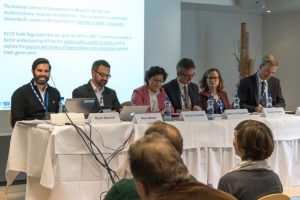Visiting the World Trade Forum @ Grindelwald
The National Centres of Competence in Research (NCCR Trade Regulation) is coming to an end after twelve years of work funded by the Swiss National Science Foundation (SNSF). During all of these year, the NCCR has been giving policy recommendations based on the disciplines of law, economics and political science in six different areas: WP1 Trade Governance, WP2 New Preferentialism in Trade, WP3 Innovation and Competitiveness in Trade Governance, WP4 Trade and the Diffusion of Migration Law, Policy and Economics, WP5 Trade and Climate Change and WP6 Impact Assessment in International Trade Regulation.
In light of the end of the World Trade Institute’s NCCR program, researchers from each of the six work packages planned events around the world as part of the NCCR Global Series on Trade Regulation, these global series culminated with the final NCCR ‘summit’, which took place during the annual the World Trade Forum Conference at the Sunstar Hotel in Grindelwald, 6-7 October 2017.
The 2017 World Trade theme was “’Trade Policy in Turbulent Times”. This topic seemed to be appropriate with the current economic and political landscape painted where forced migration, rising populism and opposition to globalisation are the main characters.
During this final event, I had the pleasure to see again familiar faces that I haven’t seen for quite some time but also, I had the opportunity to meet legal scholars, economists, political scientists and practitioners that have been examining how the world trading system have been functioning over the last decade and the way trade impacts on areas including climate change, migration, jobs etc.
During the opening conference, Prof. Elsig (Professor of International Relations and Deputy Managing Director of the World Trade Institute (WTI) of the University of Bern) remarked how much the world had changed since the NCCR project was launched in 2005. In 12 years, there has been a proliferation of trade agreements with their own particular rules which causes more and more fragmentation and uncertainty to the multilateral system. Moreover, there has been recently an increase of scepticism in the western world about their traditional model of globalization and the role it has played in job losses. However, this scepticism has been contrasted with the strong support of free market expressed by the President of China, a well know a communist country.
Despite the proliferation of preferential trade agreements, the speakers agreed that this tendency will not slow down and will play a crucial role in a world marked by global value chains. However, they also indicated that this is a wakeup call for the World Trade Organization to evolve the multilateral trade agreement and take into account the rapid change in technology. For example, ecommerce is growing 4 times faster than GDP, meaning that its necessary to create regulatory framework for this phenomenon.
Trade policy “is still alive and kicking” the speakers said, but, there are still many things to improve such as regulatory incoherence in services and goods. Lack of coherence on regulation can deeply affect the supply chain, therefore, countries still have much more work to do as well as the WTO.
Furthermore, many presenters agreed that structural changes (improvement of technology and digitalization of work) are the cause of job losses and not trade. Trade is usually blamed because is the easiest thing to do but in reality, digital transformation is more disruptive than trade. Maria Asenius of the European Commission indicated that trade wouldn’t have happened if it wasn’t beneficial for both the parties involved, in fact, she indicated that trade has been good for wealth and job creation, and “the most natural thing you can do with your clothes on”.
CBRA Blog on 31.10.2017, by Ms. Susana Wong



